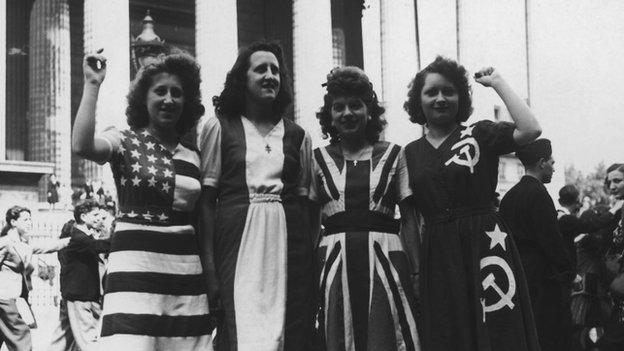VE Day: Polish refugees remember Northumberland camp
- Published
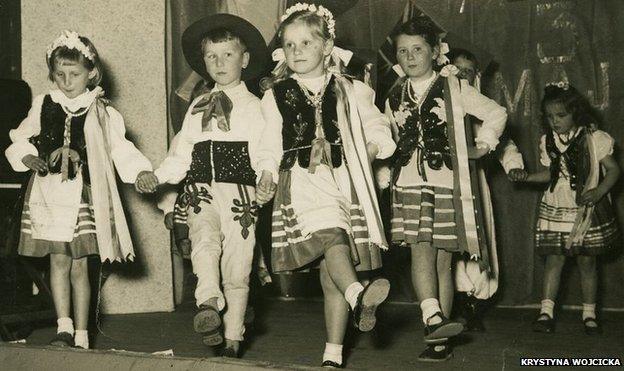
Although they were more than 900 miles from Poland the refugees kept their traditions alive at The Common Camp
As the 70th anniversary of Victory in Europe (VE) Day is celebrated, former refugees from Poland reflect on their lives in 1940s North East England.
Although the fighting in Europe officially ceased on 8 May 1945, the effects of the World War Two were far from over.
With their homes destroyed and nations now under the control of the Soviet Union, millions of Eastern Europeans found themselves in displaced persons camps around the continent, waiting for the time they could return home.
A former army camp near the Northumberland town of Morpeth became one such temporary base for hundreds of Polish refugees, external.
But for many, the North East became a permanent home.

The young girl
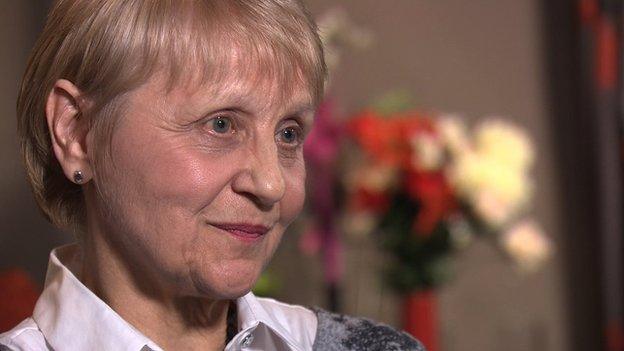
Krystyna Wojcicka was a child when she stayed at the Common Camp near Morpeth. She said it gave her and fellow Polish refugees some stability
Among the refugees coming to The Common Camp were Krystyna Wojcicka's parents and young brothers.
"There was absolutely nothing, no heating or cooking facilities or running water, people had to use a bath house and communal dining rooms and a laundry and lavatories that were all communal, so that was quite hard," she said.
"But they came here with hope for the future and I think the camp gave them a place of stability and safety to adjust to life."
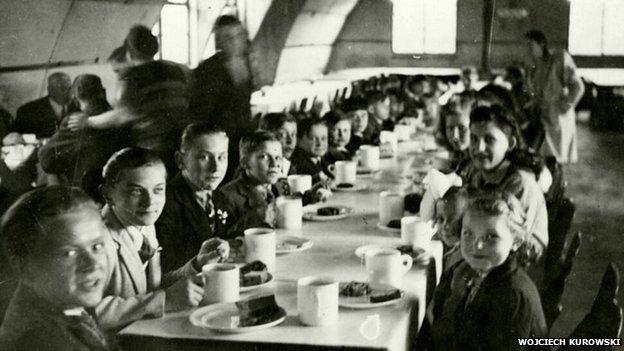
Although there was some upset at the number of refugees seeking food and shelter, many people in the North East welcomed the newcomers

The soldier
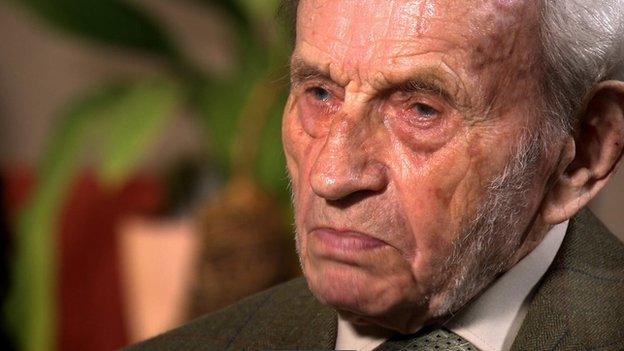
Piotr Sulek went from a Siberian labour camp to being a miner in Northumberland
Piotr Sulek was a soldier who fought with the British Army after escaping a Siberian labour camp.
The Soviet Union's occupation of his native Poland had rendered Piotr homeless, so he made his way west ending up in Northumberland.
He admits that VE Day itself brought only fear.
"I was crying because people have got wife, children in Poland but were frightened to go to Poland, they were frightened to go to Siberia again."
Piotr settled in the Morpeth camp.
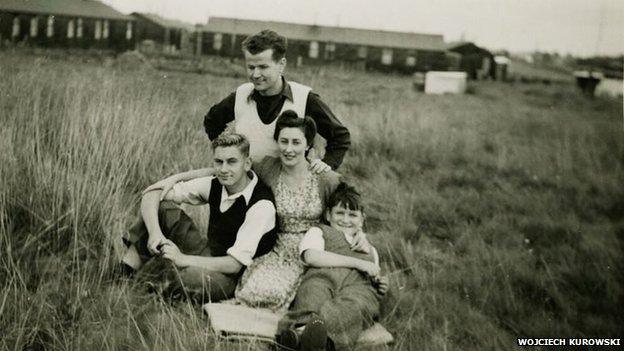
Wojciech Kurowski was a young boy when his family ended up at Morpeth after previously being in a Soviet labour camp
"It was like a small Poland and everybody was happy, was dance and music every Saturday, we keep a discipline between us.
"The English haven't got any problems with us."
Piotr Sulek found work in a pit at Ashington alongside Northumberland natives.
He said: "I was very surprised, they were very friendly with us."
But there was some discrimination.

Work
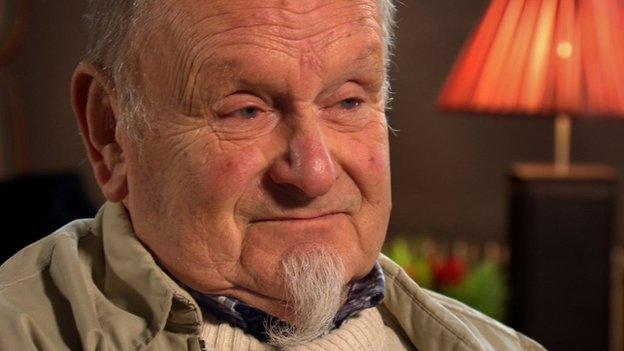
Wojciech Kurowski ended up in the Morpeth camp with his parents, uncle and aunt and brother
Not all native North Easterners welcomed the incoming Poles, with one councillor writing in the Morpeth Herald that he was "alarmed" at the numbers of people coming to the camp, calling them a "menace" due to their need for food and shelter.
About 140,000 Poles ended up in Britain which meant a large workforce, especially for the coal mining industry.
Fuel and power minister Manny Shinwell said the Polish workers would go down the mines prompting a furore from the Daily Mirror, which said they should be "deported" amongst fears they would take British jobs.
In reality, there were plenty of jobs available given the Europe-wide shortage of coal at the time.
At Woodhorn Colliery in Ashington, for example, the Poles were banned from working on piece rates, which paid more, and if jobs were to be cut the foreigners would go first.
"We was told 'if redundancy was coming Polish people are going out first, this is work for English'", Piotr Sulek said.
"We wasn't very happy, but such things never come."

Finding families
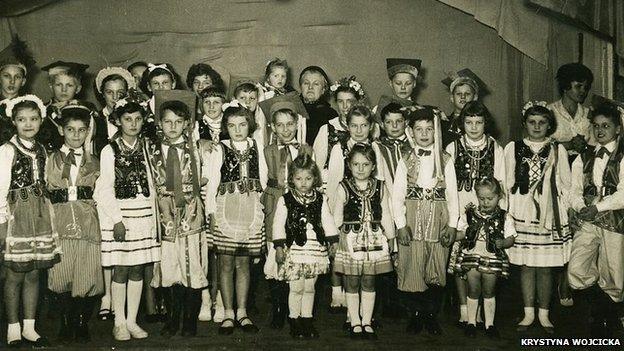
The Common Camp became known as Small Poland with dances and traditional Polish celebrations a regular event
After VE Day just finding family proved a big task for many of the refugees.
Before ending up in the Morpeth camp, Wojciech Kurowski was reunited with his father who had been serving in the British Army.
His mother did not recognise her husband after three years apart - despite being sat next to him.
Mr Kurowski said: "After about 20 minutes a man comes in and says to my mother 'well, have you introduced yourself to him?'
"She said 'no, where's my husband?'
"He said 'It's him', they were both so physically wrecked that neither of them could recognise each other."

Romance
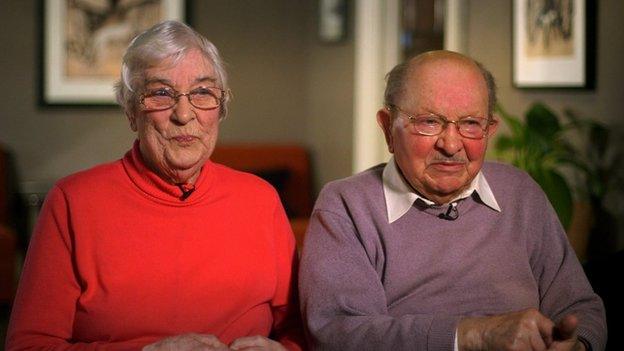
Kathleen Nurowski said her father was not happy when she started courting her future husband Zbigniew
As the Poles settled in the region romances started.
Zbigniew Nurowski spotted his future wife Kathleen at a church social evening and started courting her soon afterwards, although not everyone was happy with the blossoming love affair.
"My father was not impressed" remembers Kathleen.
"In fact he was waiting for us coming one night and told (Zbigniew) in no uncertain terms to buzz off.
"I was stepping out of line really, we didn't know many foreigners in Newcastle in those days.
"I didn't speak to my father for six months, but it was resolved."
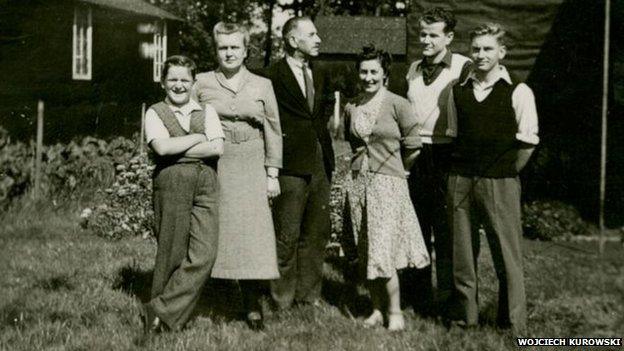
Whole families created new lives for themselves in the North East of England after VE Day
Zbigniew retrained as a photographer and ended up marrying Kathleen, although the wedding rehearsal did not exactly go to plan.
"The priest says 'don't worry, all you have to do is repeat after me and it will be alright'," he said.
"He started 'I' and I said 'I', then on a piece of paper he had my name and instead of making a mess of it he said 'say your name' and I said 'say your name'.
"Then he repeated 'say your name', me 'say your name', and at the same time (Kathleen's) digging me 'Zbiginiew Zbiginiew'."
Kathleen said: "Sometimes (Zbiginiew) says 'I don't know whether we're really married or not because I didn't know what I was talking about'."
There was further trouble when Zbiginiew failed to find landlords who would accept a foreign tenant in Newcastle.
Kathleen said: "It was 'no foreigners, no dogs and no Irish'.
"Zbigniew was like an innocent abroad, he didn't realise people didn't want him, but I wanted him and that was enough."
Their stories are part of a BBC documentary, First Days of Peace: Friends or Foes, being screened on BBC One on Monday 11 May at 19:30 BST.
- Published10 May 2015
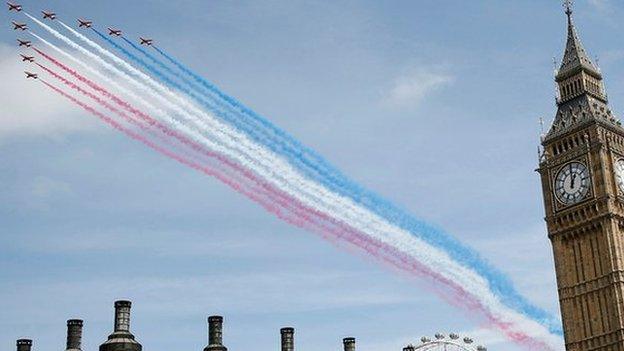
- Published10 May 2015
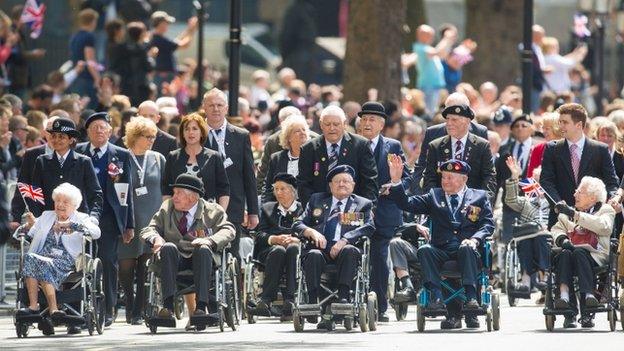
- Published8 May 2015
